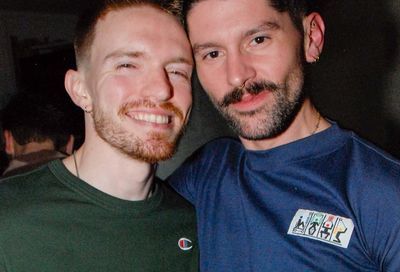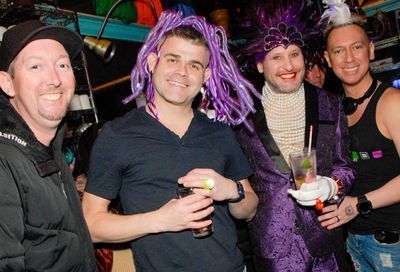One for the Goddess
Elizabeth Taylor turned celebrity activism into true leadership
The death of a screen goddess is bound to attract a circus-like atmosphere in addition to the normal obituaries and video tributes. Following the news of Elizabeth Taylor’s death on March 23, 94-year-old Zsa Zsa Gabor’s blood pressure rose and she was rushed to the UCLA Medical Center, crying, “I’m next.” AIDS activist Suzanne Africa Engo in New York City got Taylor’s name tattooed on her arms. The Phelps family of Topeka’s Westboro Baptist Church threatened to picket Taylor’s funeral, but they were foiled by her quick burial.
As the initial noise dies down — including the chatter about her two Oscars and eight husbands, her many illnesses, her jewelry and perfume — her true legacy emerges. Hers is a dual legacy. The great acting performances can be seen by visiting Movies Unlimited or checking the schedule at Turner Classic Movies. Possibly her larger legacy is the cause to which she lent time and energy as well as her fame: her early and outspoken advocacy of HIV/AIDS research, beginning in the 1980s when most others, including President Reagan, were silent.
Prior to Taylor’s AIDS activism, her friendships with gay colleagues like Roddy McDowall, Rock Hudson and Montgomery Clift were the stuff of gossip. She was the world’s leading “fag hag,” an ugly expression for what was in fact sincere and devoted friendship. She also starred in films of Tennessee Williams’s plays Cat on a Hot Tin Roof and Suddenly, Last Summer, whose gay subtexts resisted producers’ efforts to soften them.
But when AIDS hit her industry and her friends with disproportionate force, her response showed strength and determination rivaling the fictional Velvet Brown who made her a child star. She organized a fundraiser for AIDS Project Los Angeles in 1984. After Hudson died in 1985, she co-founded the American Foundation for AIDS Research with Dr. Mathilde Krim. In 1993 she created the Elizabeth Taylor AIDS Foundation.
Taylor was recognized with the Motion Picture Academy’s Jean Herscholt Humanitarian Award in 1992, a Presidential Citizens Medal in 2001, and was named a Dame Commander of the Order of the British Empire in 2000. When she was honored by the Screen Actors Guild in 1997 and the Kennedy Center in 2002, her humanitarian work was cited in addition to her acting.
She was surprised and thrilled in December 2002 at the Kennedy Center Honors when the Gay Men’s Chorus of Washington joined in the tribute to her, a producer’s inspiration that demonstrated the change she had helped nurture. Her memory lives on in Washington at Whitman-Walker Clinic’s Elizabeth Taylor Medical Center on 14th Street NW.
Some people are dismissive of performers who use their celebrity to advocate for causes. It’s as if being an actor automatically makes you brainless and unfit to express an opinion, or your motives are considered suspect. In the case of Taylor in the mid-1980s, she confronted not only the usual dismissiveness toward celebrities but an environment of fear and stigma in which ignorance, irrationality and homophobia mixed into a toxic brew. Seeing her nation’s government ignore a health crisis and watching her friends suffer, she felt compelled to act. As she put her fame and reputation on the line, the strength that had sustained her through many personal crises served her well.
True leadership is rare, as is clear from the spectacle of politicians leaping opportunistically from one position to its opposite. Taylor became a leader and made a difference simply by standing her ground, speaking from her soul, and believing in her fellow citizens.
Her violet eyes mesmerized us, and her messy love life titillated us; but her compassion and dedication set a splendid example of civic virtue. Here’s to Dame Elizabeth Taylor.
Richard J. Rosendall is a writer and activist. He can be reached at rrosendall@starpower.net.‘
Support Metro Weekly’s Journalism
These are challenging times for news organizations. And yet it’s crucial we stay active and provide vital resources and information to both our local readers and the world. So won’t you please take a moment and consider supporting Metro Weekly with a membership? For as little as $5 a month, you can help ensure Metro Weekly magazine and MetroWeekly.com remain free, viable resources as we provide the best, most diverse, culturally-resonant LGBTQ coverage in both the D.C. region and around the world. Memberships come with exclusive perks and discounts, your own personal digital delivery of each week’s magazine (and an archive), access to our Member's Lounge when it launches this fall, and exclusive members-only items like Metro Weekly Membership Mugs and Tote Bags! Check out all our membership levels here and please join us today!



















